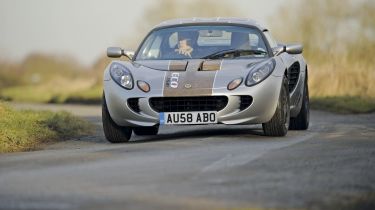Lotus Eco Elise
Efficient two-seater proves sports cars can care for environment.

There’s much to admire about the Eco Elise. It proves that green materials and performance models can go hand-in-hand without detracting from the driving experience. Considering the firm’s involvement in developing the electric Tesla Roadster, it can’t be long before Lotus comes up with the most eco-friendly sports car in the world.
Which company makes the environmentally friendliest cars? Most buyers might think Honda or Toyota, but one firm has quietly been producing eco models for years: Lotus.
Thanks to founder Colin Chapman’s famous philosophy of ‘performance through light weight’, the likes of the Elise have been fast and eco-minded, returning around 35mpg. And this is the greenest version yet.
The one-off Eco demonstrates how recyclable materials and environmentally friendly thinking can be used on a Lotus road car. While it may be ‘green’, the model’s predominant colour is actually brown, because much of it is made from hemp. This is grown next to Lotus’ base in Hethel, Norfolk, and mixed with a resin to form the seats and hard-top, plus panels in the bonnet and rear wing. Also, solar panels charge the air-con.
Inside, sisal – another renewable crop – covers the floor, and the seat trim is made from wool from different breeds of sheep. There is a similar material on the doors and gearlever, while the paint is water-based. The overall effect is striking, yet the cabin feels homely and welcoming, too.
A lightweight stereo and alloys ensure the Eco tips the scales at 828kg – that’s 32kg less than a standard Elise – and the dash shift light flashes not at the rev limit, but at the most efficient point to change up. All the tweaks boost economy by 25 per cent to 42.7mpg, while CO2 drops 12g/km to 184g/km.
The driving experience is barely changed: it's still brilliant. Steering is pin-sharp and the 134bhp 1.8-litre engine gives strong and instant acceleration. Follow the gearshift indicator and it’s easy to maintain a swift pace – the lightweight Elise always pulls well at low revs – and return excellent economy.
As for the future of the Eco Elise, Lotus is set to introduce many of the green production techniques and recyclable materials on its cars in the next few years. Honda and Toyota’s reputations are under attack.
Rival: Morgan Lifecar
With a hydrogen fuel cell and lightweight panels, the Lifecar shows again that sports cars can be green. But while Morgan is working hard to develop it, this model is still some years away from production.







